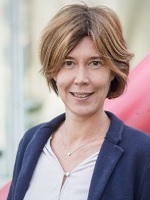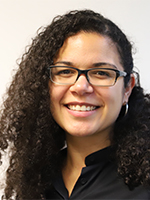
Wir wollen den Girls‘ Day heute nutzen, um jungen Frauen Mut für eine Karriere in den Naturwissenschaften zu machen. Für nützliche Tipps und Inspiration haben wir drei unserer weiblichen PIs gefragt: Prof. Dr. Melanie Esselen, Institut für Lebensmittelchemie, Prof. Dr. Monika Schönhoff, Institut für Physikalische Chemie, Dr. Nella Vargas-Barbosa, Helmholtz-Institut Münster. Lest hier, was sie Frauen in der Wissenschaft raten, was sie inspiriert und wer ihre Vorbilder sind.

What made you choose a career in STEM?
Melanie Esselen: Fascinating, innovative, trendsetting and interdisciplinary field of science.
Monika Schönhoff: I always loved the logic of math and physics, and the elegance that unfolds when describing a physical phenomenon by a simple equation. Choosing science as a career came by just continuing what I like to do most.
Nella Vargas-Barbosa: My first experience with STEM was as a high school student at the 1st Nano Summer Camp sponsored by the NSF (National Science Foundation, US), NASA and the University of Puerto Rico – Rio Piedras Campus. During this 8-week camp, I had the opportunity to work in the electroanalytical chemistry laboratory of Prof. Carlos Cabrera and did research on the effect of substrate metal on the activity of Pt-Ceria composite catalysts for methanol fuel cells. This experience was the turning point for my career: I was exposed to electrochemistry for the first time, was immediately hooked and never looked back.
Did/do you have a role model?
Melanie Esselen: I had several role models, especially my STEM teachers at school who had sparked my curiosity for natural sciences and my doctoral supervisor who perfectly mastered her position as the only professor in her department.
Monika Schönhoff: Not really, not a female one. I had (male) supervisors, though, from whom I learnt a lot concerning how to address scientific problems.
Nella Vargas-Barbosa: Dr. Sharon Hammes-Schiffer is an absolute rockstar in the chemistry community, and she is someone I aspire to be. She’s incredibly brilliant and continues to revolutionize the field of theoretical chemistry. She is also unapologetically herself at all times, and I always learn something new every time I have a chance to hear her speak.

What does inspire you most during your everyday work?
Melanie Esselen: To work with enthusiastic and creative young people.
Monika Schönhoff: When in the discussions with my students about any “weird” data suddenly ideas develop on how to explain them, often identifying very unexpected effects, and finally all results fall into place and fit, explained by a new effect.
Nella Vargas-Barbosa: I am inspired whenever one of my students shows new data. Preliminary results are always the start of a new (science) story waiting to be written, both with additional experiments and as a manuscript.
What would you have liked to know as a (female) doctoral student?
Melanie Esselen: I would never miss the time as doctoral student. You are more or less independent. You are occupied with your own research project and you have memorable moments with your colleagues. Your skills attested by these qualifications and experiences should shape your personal and professional life.
Monika Schönhoff: I would have liked to know earlier how the scientific world is working, e.g. publishing, getting funding, making a scientific career. We did not have any structured programs or workshops about such topics at my time.

What would be the most important advice you would give (female) Ph.D. candidates who want to pursue a career in science?
Melanie Esselen: Personal and professional life will consist of compromises- if women will learn to accept this fact nothing is standing in the way of a successful career in science.
Monika Schönhoff: 1. Very simply: Go for it! 2. Choose your postdoc project wisely with a topic that adds to your expertise and carries you to an innovative field. 3. Seek independence by own funding.
Nella Vargas-Barbosa: There is no good time to have children if you are pursuing a career in science. Pregnancy, birth and becoming a parent is full of (unexpected) experiences that cannot be planned for. One pretty much just has to manage things as they come, including kids. Therefore, I recommend not to delay your career because of kids, or to delay kids because of your career. Figure out what you want for yourself and then pursue that.
Mehr über die Fachgebiete unserer PIs findet ihr hier:
https://www.uni-muenster.de/imperia/md/content/baccara/baccara_experts.pdf
